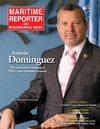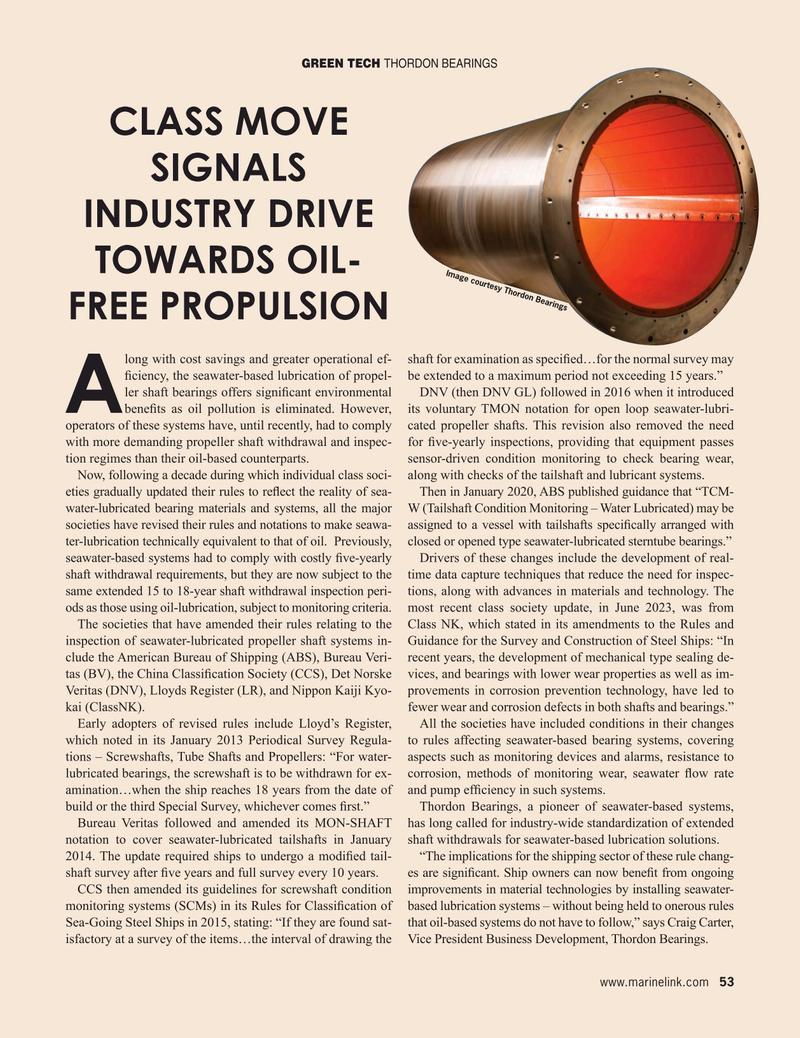
Page 53: of Maritime Reporter Magazine (May 2024)
Read this page in Pdf, Flash or Html5 edition of May 2024 Maritime Reporter Magazine
GREEN TECH THORDON BEARINGS
CLASS MOVE
SIGNALS
INDUSTRY DRIVE
TOWARDS OIL-
Image courtesy Thordon Bearings
FREE PROPULSION long with cost savings and greater operational ef- shaft for examination as speci? ed…for the normal survey may ? ciency, the seawater-based lubrication of propel- be extended to a maximum period not exceeding 15 years.” ler shaft bearings offers signi? cant environmental DNV (then DNV GL) followed in 2016 when it introduced
Abene? ts as oil pollution is eliminated. However, its voluntary TMON notation for open loop seawater-lubri- operators of these systems have, until recently, had to comply cated propeller shafts. This revision also removed the need with more demanding propeller shaft withdrawal and inspec- for ? ve-yearly inspections, providing that equipment passes tion regimes than their oil-based counterparts. sensor-driven condition monitoring to check bearing wear,
Now, following a decade during which individual class soci- along with checks of the tailshaft and lubricant systems. eties gradually updated their rules to re? ect the reality of sea- Then in January 2020, ABS published guidance that “TCM- water-lubricated bearing materials and systems, all the major W (Tailshaft Condition Monitoring – Water Lubricated) may be societies have revised their rules and notations to make seawa- assigned to a vessel with tailshafts speci? cally arranged with ter-lubrication technically equivalent to that of oil. Previously, closed or opened type seawater-lubricated sterntube bearings.” seawater-based systems had to comply with costly ? ve-yearly Drivers of these changes include the development of real- shaft withdrawal requirements, but they are now subject to the time data capture techniques that reduce the need for inspec- same extended 15 to 18-year shaft withdrawal inspection peri- tions, along with advances in materials and technology. The ods as those using oil-lubrication, subject to monitoring criteria. most recent class society update, in June 2023, was from
The societies that have amended their rules relating to the Class NK, which stated in its amendments to the Rules and inspection of seawater-lubricated propeller shaft systems in- Guidance for the Survey and Construction of Steel Ships: “In clude the American Bureau of Shipping (ABS), Bureau Veri- recent years, the development of mechanical type sealing de- tas (BV), the China Classi? cation Society (CCS), Det Norske vices, and bearings with lower wear properties as well as im-
Veritas (DNV), Lloyds Register (LR), and Nippon Kaiji Kyo- provements in corrosion prevention technology, have led to kai (ClassNK). fewer wear and corrosion defects in both shafts and bearings.”
Early adopters of revised rules include Lloyd’s Register, All the societies have included conditions in their changes which noted in its January 2013 Periodical Survey Regula- to rules affecting seawater-based bearing systems, covering tions – Screwshafts, Tube Shafts and Propellers: “For water- aspects such as monitoring devices and alarms, resistance to lubricated bearings, the screwshaft is to be withdrawn for ex- corrosion, methods of monitoring wear, seawater ? ow rate amination…when the ship reaches 18 years from the date of and pump ef? ciency in such systems.
build or the third Special Survey, whichever comes ? rst.” Thordon Bearings, a pioneer of seawater-based systems,
Bureau Veritas followed and amended its MON-SHAFT has long called for industry-wide standardization of extended notation to cover seawater-lubricated tailshafts in January shaft withdrawals for seawater-based lubrication solutions.
2014. The update required ships to undergo a modi? ed tail- “The implications for the shipping sector of these rule chang- shaft survey after ? ve years and full survey every 10 years. es are signi? cant. Ship owners can now bene? t from ongoing
CCS then amended its guidelines for screwshaft condition improvements in material technologies by installing seawater- monitoring systems (SCMs) in its Rules for Classi? cation of based lubrication systems – without being held to onerous rules
Sea-Going Steel Ships in 2015, stating: “If they are found sat- that oil-based systems do not have to follow,” says Craig Carter, isfactory at a survey of the items…the interval of drawing the Vice President Business Development, Thordon Bearings. www.marinelink.com 53
MR #5 (50-60).indd 53 5/3/2024 8:08:09 AM

 52
52

 54
54
